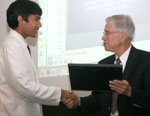|
|

|
Students gain lab experience with faculty
|
by Connor Watkins
Public Relations
If the audience had their eyes closed, they would think that the
students giving presentations on their research projects July 17 were
graduate students instead of rising high school seniors attending the
South Carolina Governor’s School for Science and Mathematics (GSSM).
This summer, 14 GSSM students traded their days at the beach to conduct
research and analyze data alongside MUSC faculty as part of the College
of Graduate Studies’ Summer Program for Research Interns (SPRI).
 Dr.
Perry Halushka, right, congratulates Ramiz Hamid on his completion of
the College of Graduate Studies' Summer Program for Research Interns. Dr.
Perry Halushka, right, congratulates Ramiz Hamid on his completion of
the College of Graduate Studies' Summer Program for Research Interns.
“It’s a delight for us to have the Governor’s School students here
every summer,” said Perry Halushka, M.D., Ph. D., College of Graduate
Studies dean. “The faculty really invests in the students during the
research program.”
The SPRI gave as many as 70 students from GSSM an opportunity to
complete a six week, hands-on experience in an area of science that
they are interested in such as cancer research, biomedical experiments
and computer science. Once they’ve chosen a field and mentor, students
spent their internships at corporate research and development labs,
hospital cancer centers and research universities working under an
established scientist-mentor.
Victor Brown, who experimented with the affects of vitamin D on
multiple sclerosis, made the most of his time with his mentor, Narayan
Bhat, Ph.D., a neurosciences professor.
“I enjoyed being able to work in the lab. Having hands-on experiences,
working with someone who knew so much about a particular field and
being able to learn from them is what I enjoyed the most about this
experience,” said Brown.
“This is an extraordinary experience,” explained Murray Brockman,
Ph.D., GSSM president who attended the research presentations. “The
increased intellectual maturity of the students is remarkable as they
go through an actual research experience.”
Ramiz Hamid, a Beaufort resident pursuing a career in clinical health
care, chose to explore the field of cancer immunology, focusing on
prostate cancer. Under the supervision of Azizul Haque, Ph.D.,
assistant professor, Department of Microbiology and Immunology, Hamid
tested to see how re-inserting a protein, Gamma-interferon-Inducible
Lysosomal Thiol reductase (GILT), into prostate cancer cells affects
cytokine gene expression. The results suggest that induced GILT
expression in prostate cancer cells may restore immune function by down
regulating inhibitory cytokines. This may result in the detection and
destruction of cancer cells by the immune system.
Like other mentor-scientists, Hamid appreciated the support and help of
student contributions to his lab and research throughout these past six
weeks.
“The graduate students really helped me see the big picture,” he said.
“Besides watching and learning the day-to-day techniques, they showed
me how those techniques apply to the research goal as a whole, which
was to create a cancer vaccine.”
In the Gazes Research Auditorium, SPRI participants presented their
data and findings to their family members, fellow students and MUSC
faculty.
Hadi Hamid, father of Ramiz Hamid, was one of several parents sitting
in the auditorium that day. “I was amazed at the amount of knowledge he
had gained and impressed by the way he was presenting it,” he said.
”I’m very proud of him.”
Though the program has ended, the students continue to build on their
research throughout the upcoming academic year. SPRI participants will
read books and articles relating to their research focus and ultimately
translate that knowledge into a report that they will complete by
February 2010.
Friday, Aug. 14, 2009
|
|
|



